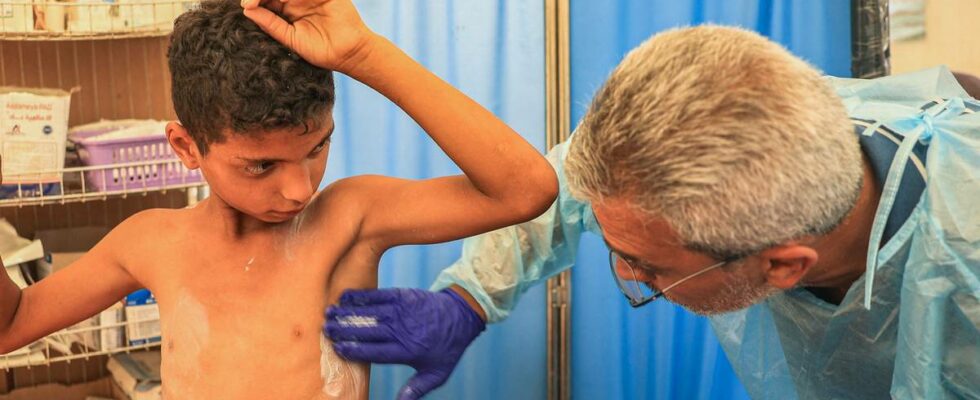A Palestinian man walks in a sea of garbage in the tiny town of Zawaida in the middle of the Gaza Strip. When he catches sight of the photographers from the UN, he stops. – If we don’t get sick, we will die from the bombs, he shouts in frustration. – And if we don’t die from the bombs, we will die from the sea. Because even in the sea there is now rubbish and sewage, tell Palestinians in the Gaza Strip. Before, they used to wash there. It is no longer justifiable, they believe. Another man shows off all the bites he has received from the insects that swarm around him. The stench from the rubbish penetrates through the makeshift tents in the area. In the absence of functioning waste facilities, rubbish is collected and dumped in open areas around the Gaza Strip. And because of the high temperature, the bacteria spread faster than before. Scabies and lice There is also limited access to clean drinking water, sanitary facilities and the possibility to wash oneself. That is why skin diseases are spreading in the Gaza Strip. Scabies, lice, rashes, chicken pox and jaundice in the eye are some of what aid organizations report on. – Scabies and lice are particularly common, and it is almost impossible to treat. People live close together in tents. In the end, everyone gets it, says amnesty nurse in Legar without Borders Renald Menard to news. A little girl at the Kamal Adwan hospital in the north of Gaza has developed a rash on her body as a result of malnutrition. Photo: Omar Al-Qattaa / AFP The youngest children are especially vulnerable. Due to a lack of water and nutrition, they have not been able to develop a good immune system. They therefore become infected with diseases more quickly, and tolerate them worse. – For the little ones, scabies and lice are a nightmare. It itches constantly. It affects both sleep and mental health, says Menard. The water supply is critically low The treatment is basically simple. One must wash all one’s clothes and use a cream. But without access to clean water, the task is impossible. According to figures from the UN, around 67 percent of the water and sanitation facilities in the Gaza Strip have been destroyed in “conflict-related activities”. The plants that still exist are either out of operation or operating at a limited level due to a lack of fuel and other equipment. Israel, together with Egypt, controls the border crossings into the Gaza Strip, and thus everything coming in and out of the area. Aid organizations constantly criticize Israel for not letting in enough emergency aid for the Palestinians in the Gaza Strip. Israel, on the other hand, claims that they have made arrangements to allow sufficient emergency aid to cross the border, and rather blame it on the aid organizations that have not organized themselves well enough. – When I was in Gaza, we only had access to sterile salt water. But salt water is not enough if you want to clean your skin properly, says Menard. Women affected in different ways Menard says that the situation affects women in a different way than men. – This is a Muslim country. Women cannot go to the bathroom in front of others. And when 3,000 people have to share two toilets, it goes without saying that the women are not allowed to go to the toilet when they need to. Therefore, many people get urinary tract infections and fungus in the abdomen – in addition to skin diseases and waterborne diseases. Published 06.07.2024, at 22.19
ttn-69
Scabies, lice and rashes – skin diseases spread in the Gaza Strip – news Urix – Foreign news and documentaries

